MENU
MENU
Tea production area: Echizen City
Brand name of tea: Ajimano tea
Type of tea: Sencha (medium steamed green tea) and black tea
Ajimano tea
It is said that tea has been cultivated in Ajimano, Echizen City since the Muromachi Period (1336 – 1573).
The tea industry flourished during the Edo Period (1600-1868). However, the tea industry has now declined due to a shortage of successors.
Tea plants were planted as hedges for boundaries between neighboring houses or fields and for protection against wind and soil runoff . Tea was produced for personal use. Such tea plants still remain.
Now there is only one communal tea factory, but only one tea farmer in Ajimano.
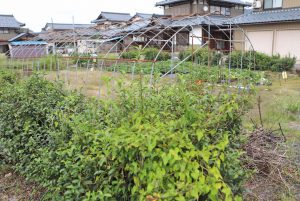
Tea plants which were used as hedges for boundaries of fields (September 2018)
Ajimano cha hozonkai (味真野茶保存会 Ajimano Tea Preservation Society)
Ajimano cha hozonkai was established in 2011 to promote a folk song from Fukui Prefecture, “Ajimano chamomi uta (handmade Ajimano tea-rolling song)”, and revived Ajimano tea. A national competition of the song (味真野茶もみ唄全国コンクール) has been held each year since 2010, except for 2020 due to the spread of COVID-19.
The volunteer members are managing the tea gardens in Ajimano and producing Ajimano tea.
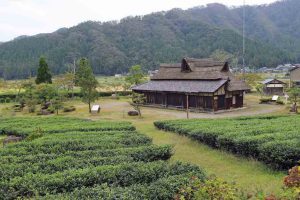
Tea garden in Manyonosato Ajimanoen (万葉の里味真野園) (September 2019)
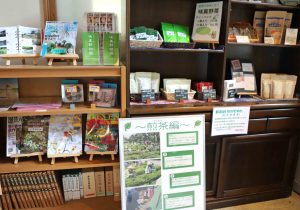
Tea shop of Manyokikkaen (万葉菊華園) (September 2018)
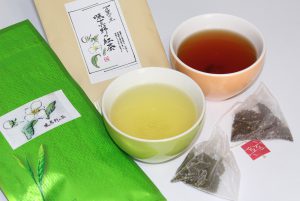
Ajimano tea (sencha and black tea) (September 2018)
Tea garden of Jofukuji temple
The Jofukuji Baba site is a stable where the Matsudaira family, lords of the Echizen Fukui domain, stopped their kago (palanquins) and hitched their horses when they visited Jofukuji Temple.
There is also a Hanagatami cherry tree associated with the Emperor Keitai. The lord visited the temple each year to view the cherry tree, but after his family moved to Tokyo, the event was no longer held. And so tea plants, a specialty of Ajimano, were planted at the site.
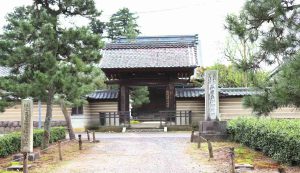
Jofukuji-temple (September 2018)
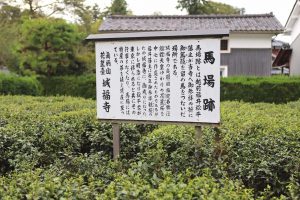
Tea garden at Jofukuji Baba site (September 2018)
Fukui’s Kurocha (dark tea)
Kurocha was produced near Mikata lake.
Related article on the site:
Tea related facilities:
越前市万葉の里味真野苑
https://www.city.echizen.lg.jp/office/060/050/040/ajimanoen.html
福井県の文化財 城福寺庭園
http://info.pref.fukui.jp/bunka/bunkazai/sitei/meishou/jofukuji-teien.html
Local tea mascot:
Tea related event: 味真野茶もみ唄全国コンクール
Ceramic and pottery art: Bizen ware
Reference:
城福寺馬場跡の茶園にある説明文
松下智 (平成3年) 日本名茶紀行 (初版) 雄山閣出版
*When visiting the shops and facilities introduced in this article, please check the business hours on their website, etc. before visiting.
*The information provided on this site may be updated. If you find any information in this article that is incorrect, new, or incomplete, please contact CHAMART.
*The site does not describe all “Teas of Japan” or all “Teas of the World”. Additionally, each article expresses the writer’s personal experience and feelings.
#ajinanotea #fukui